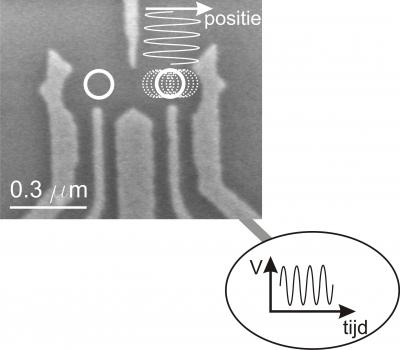Home > Press > Delft University of Technology rotates electron spin with electric field
 |
| An electron microscope photo of a nanostructure similar to that used in the experiment. The light-grey colors show the metal structure (made of gold) used to create an electric trap (white lines) for the electrons. A voltage (V) that changes with time is applied to the rightmost piece of metal. As a result, the electron, which is locked in the right trap, feels an electric field. This electric field causes the electron to move (white dotted line), so that the position of the electron changes with time.
Credit: TU Delft |
Abstract:
Researchers at the Delft University of Technology's Kavli Institute of Nanoscience and the Foundation for Fundamental Research on Matter (FOM) have succeeded in controlling the spin of a single electron merely by using electric fields. This clears the way for a much simpler realization of the building blocks of a (future) super-fast quantum computer. The scientists will publish their work in Science Express on Thursday 1 November.
Delft University of Technology rotates electron spin with electric field
Delft, Netherlands | Posted on November 1st, 2007Controlling the spin of a single electron is essential if this spin is to be used as the building block of a future quantum computer. An electron not only has a charge but, because of its spin, also behaves as a tiny magnet. In a magnetic field, the spin can point in the same direction as the field or in the opposite direction, but the laws of quantum mechanics also allow the spin to exist in both states simultaneously. As a result, the spin of an electron is a very promising building block for the yet-to-be-developed quantum computer; a computer that, for certain applications, is far more powerful than a conventional computer.
At first glance it is surprising that the spin can be rotated by an electric field. However, we know from the Theory of Relativity that a moving electron can ‘feel' an electric field as though it were a magnetic field. Researchers Katja Nowack and Dr. Frank Koppens therefore forced an electron to move through a rapidly-changing electric field. Working in collaboration with Prof. Yuli V. Nazarov, theoretical researcher at the Kavli Institute of Nanoscience Delft, they showed that it was indeed possible to turn the spin of the electron by doing so.
The advantage of controlling spin with electric fields rather than magnetic fields is that the former are easy to generate. It will also be easier to control various spins independently from one another - a requirement for building a quantum computer - using electric fields. The team, led by Dr. Lieven Vandersypen, is now going to apply this technique to a number of electrons.
####
For more information, please click here
Contacts:
Frank Nuijens
31-152-784-259
Copyright © Delft University of Technology
If you have a comment, please Contact us.Issuers of news releases, not 7th Wave, Inc. or Nanotechnology Now, are solely responsible for the accuracy of the content.
| Related News Press |
Spintronics
![]() Quantum materials: Electron spin measured for the first time June 9th, 2023
Quantum materials: Electron spin measured for the first time June 9th, 2023
Quantum Computing
![]() Researchers develop molecular qubits that communicate at telecom frequencies October 3rd, 2025
Researchers develop molecular qubits that communicate at telecom frequencies October 3rd, 2025
![]() Researchers tackle the memory bottleneck stalling quantum computing October 3rd, 2025
Researchers tackle the memory bottleneck stalling quantum computing October 3rd, 2025
![]() Japan launches fully domestically produced quantum computer: Expo visitors to experience quantum computing firsthand August 8th, 2025
Japan launches fully domestically produced quantum computer: Expo visitors to experience quantum computing firsthand August 8th, 2025
Discoveries
![]() Researchers develop molecular qubits that communicate at telecom frequencies October 3rd, 2025
Researchers develop molecular qubits that communicate at telecom frequencies October 3rd, 2025
![]() Next-generation quantum communication October 3rd, 2025
Next-generation quantum communication October 3rd, 2025
![]() "Nanoreactor" cage uses visible light for catalytic and ultra-selective cross-cycloadditions October 3rd, 2025
"Nanoreactor" cage uses visible light for catalytic and ultra-selective cross-cycloadditions October 3rd, 2025
Announcements
![]() Rice membrane extracts lithium from brines with greater speed, less waste October 3rd, 2025
Rice membrane extracts lithium from brines with greater speed, less waste October 3rd, 2025
![]() Researchers develop molecular qubits that communicate at telecom frequencies October 3rd, 2025
Researchers develop molecular qubits that communicate at telecom frequencies October 3rd, 2025
![]() Next-generation quantum communication October 3rd, 2025
Next-generation quantum communication October 3rd, 2025
![]() "Nanoreactor" cage uses visible light for catalytic and ultra-selective cross-cycloadditions October 3rd, 2025
"Nanoreactor" cage uses visible light for catalytic and ultra-selective cross-cycloadditions October 3rd, 2025
|
|
||
|
|
||
| The latest news from around the world, FREE | ||
|
|
||
|
|
||
| Premium Products | ||
|
|
||
|
Only the news you want to read!
Learn More |
||
|
|
||
|
Full-service, expert consulting
Learn More |
||
|
|
||








